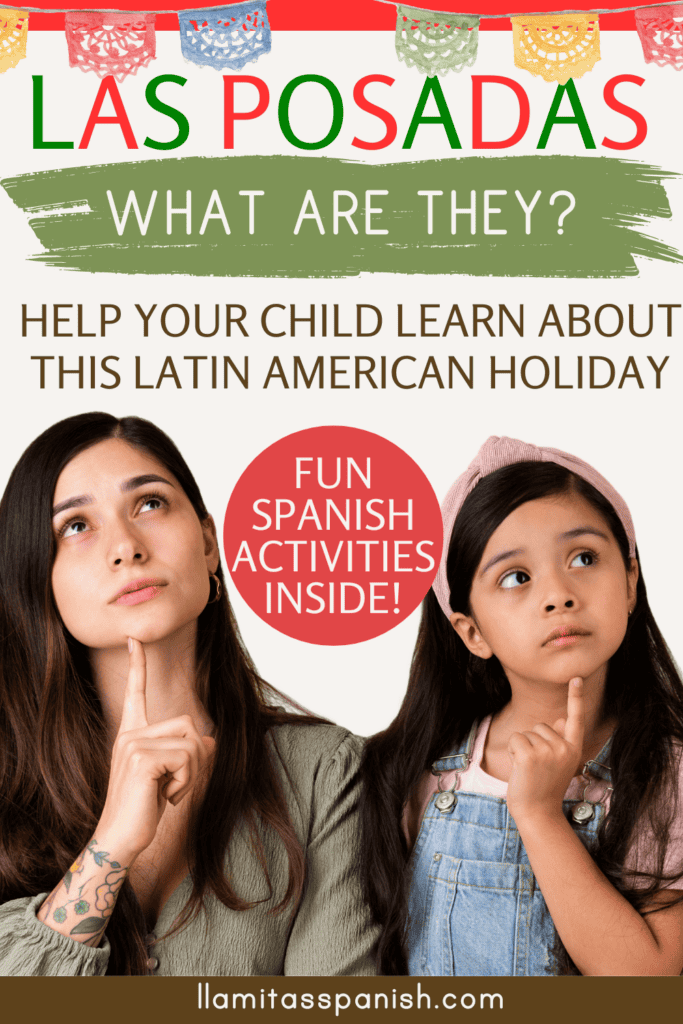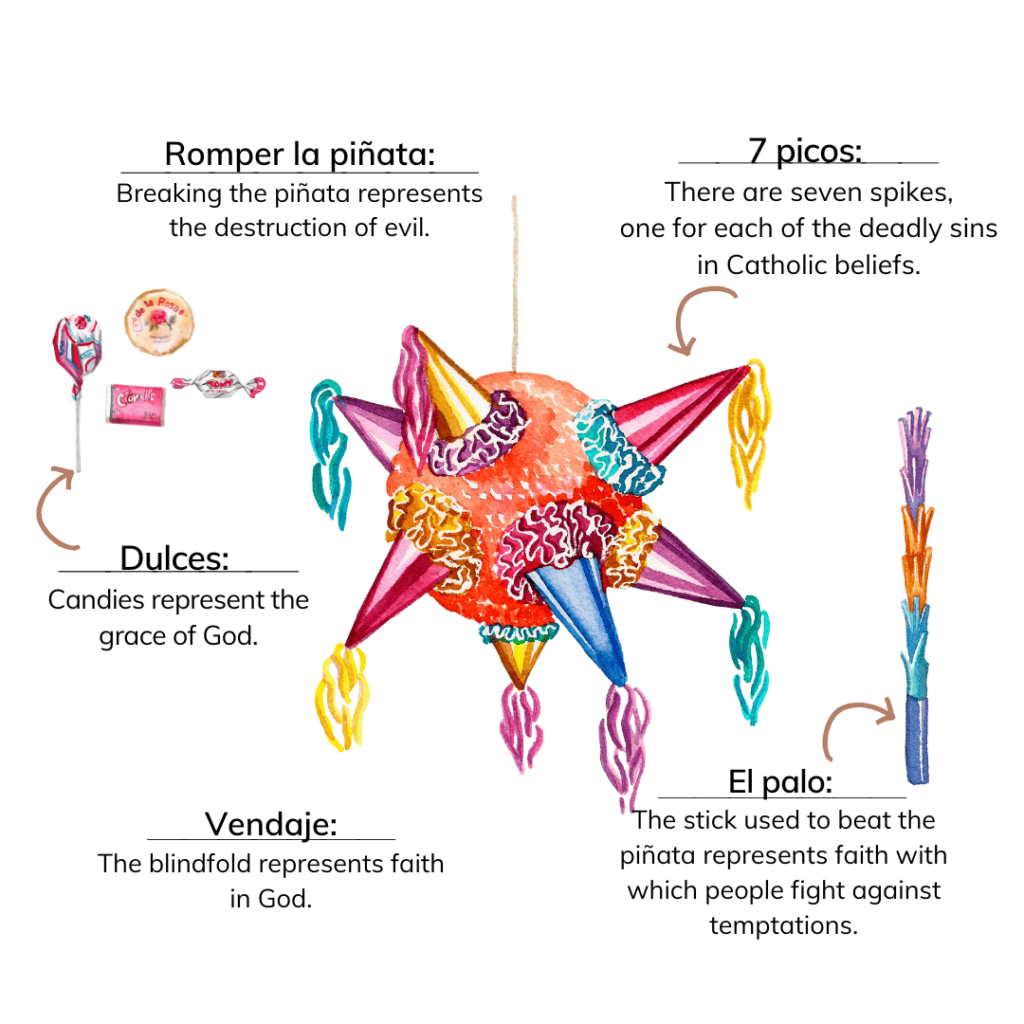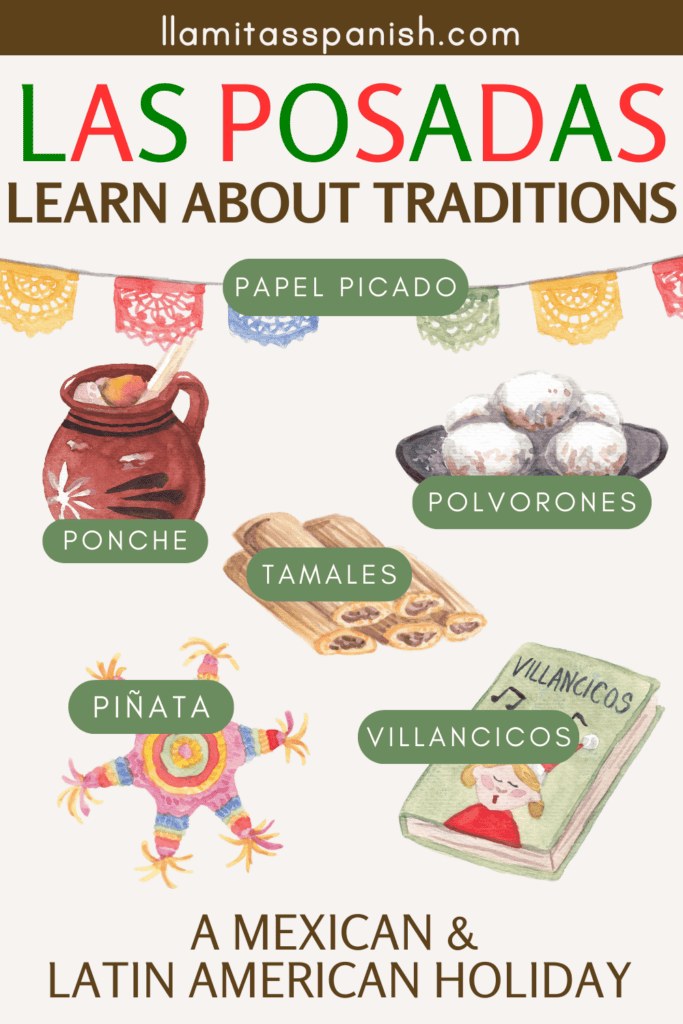In this post: Learn about the traditions and meaning behind “Las Posadas”, a nine day celebration during the Christmas holidays in Hispanic culture.
At Llamitas Spanish we are passionate about teaching our students cultural appreciation and the holidays are always rich in traditions!
Not only does observing traditional festivities enhance our holiday fun and help us learn new songs and phrases in Spanish, it also teaches us about cultural customs that are important to our Hispanic/Latino heritage.

One custom in particular that is lots of fun for children is the holiday tradition of Las Posadas.
Table of Contents
Spanish Lessons about Las Posadas
For those families who are committed to the beautiful journey of raising bilingual and bicultural children, our Llamitas Spanish Holiday Bundle can support you in teaching your child about cultural traditions like Las Posadas.
Our “Navidad” (Christmas) unit included in the bundle includes a lesson about Las Posadas. Materials include a read-aloud, printables, songs, and games.

What are Las Posadas?
Las Posadas is a traditional Mexican and Latin American holiday celebration, of religious origin, that takes place between December 16 and 24.
Las Posadas originated in Mexico when the Spanish conquistadores saw that natives celebrated traditional Aztec festivities of the Panquetzaliztli during those dates.
These festivities celebrated Huitzilopochtli, the god of war. Over time, Spanish friars slowly modified and transformed the Aztec celebrations and their symbols to align them with Catholic traditions, replacing the image of Huitzilopochtli with statues of Mary and Joseph to spread their religious traditions to the native people.
As time passed, the celebration became popular in Mexican households and neighborhoods across the entire country, spreading to areas of Central America and the Southwestern United States, which was once a part of Mexico.
This colorful traditional celebration is filled with delightful rituals and symbolism.
How to Celebrate Las Posadas
The festival tradition includes a procession that takes place every evening in small towns and neighborhoods, beginning on December 16, nine days before Noche Buena, or Christmas Eve.
During the celebration of Las Posadas, which lasts for nine consecutive evenings (la novena), participants re-enact the journey undertaken by Saint Joseph and the Virgin Mary from Nazareth to Bethlehem.
Children and families join together in a procession to fill the streets with song and holiday cheer. The group visits one house along the way every evening, and the hosts offer food and drinks, along with a bag filled with a mixture of sweet treats and peanuts called colación.

ID 164017067 | Las Posadas © Carlos Duarte | Dreamstime.com
At the end of each evening, a traditional seven-pointed piñata is broken and more delights can be gathered.
Typically, one child is chosen to dress up as an angel and to lead the procession consisting of other children wearing silver and gold robes. They carry lit candles through the streets of the town or neighborhood singing traditional canciones navideñas. Adults follow along behind the children.
What is the Meaning of Posada?
The word posada means inn, or a place to stop during a long journey, and the tradition is that the procession stops at nine posadas along its path, re-enacting Joseph and Mary’s search for a place to spend the night each night along their journey.
Each of the nine days is also dedicated to cultivating a different virtue. These nine virtues are: generosity, humility, charity, courage, detachment, purity, justice, joy, and trust, which are demonstrated as the community comes together to share music, food and drinks for this celebration.
The houses along the path of the procession are decorated with traditional Mexican cut paper banners, brightly colored lanterns, and/or colored lights. Participating neighbors can decorate their homes this way and hang the traditional seven-pointed piñata as a sign of their participation.
The customary holiday decoration inside each home is El Nacimiento, or the traditional Nativity scene with Joseph and Mary watching over Baby Jesus in the manger, sometimes surrounded by Los Reyes Magos, barnyard animals, and angels.
The children and families march through the streets singing canciones and choose one home to stop at each night, where neighborhood families will gather for food and drink and to break the customary piñata at the end of the night.
The Seven Spiked Piñata
In our Llamitas Spanish Holiday bundle, students learn about the 7-pointed piñatas which are a critical component of the posada tradition.
Traditionally, the piñata must be crafted using bright colors and shiny tinsel because it represents the evils of the seven deadly sins and the ways in which these evils seduce the souls of the innocent and incite them into a life of sin.

The seven points represent each of the seven deadly sins in Christianity, which are: pride, greed, wrath, envy, lust, gluttony and sloth.
The person who is selected to break the piñata – typically a child – by beating it with a stick must also be blindfolded, because this represents the believer whose faith is so powerful that they don’t need to see proof of God’s virtue with their eyes.
The beating of the piñata with a stick represents the triumph of good versus evil, as the innocent child overcomes the temptation of the seven sins. The piñata must dispense treats once broken, because these represent God’s virtue and the rewards for overcoming temptation and sin.
Las Posadas Traditions
The tradition for celebrating las posadas includes music, of course, and typically, there are musicians in the procession. In some villages, the townspeople carry a manger scene or statues of Joseph and Mary in the procession.
Dressing children up as angels or as Joseph or Mary, in some cases with Mary even riding a real donkey, are also common traditions. The carolers stop at different houses and ask for permission to enter, but permission is always denied except at one house each night.
The house that ends up hosting the evening festivities will provide traditional foods such as ponche, atole, tamales, pozole, buñuelos, and café de olla.

Las Posadas Across Latin America
The tradition of las Posadas, with community members going door to door, is also celebrated in many other countries.
In Central American countries such as Guatemala, Nicaragua, Honduras, and El Salvador, the custom is maintained and practiced similarly to the Mexican tradition, with the difference being that the festivities begin on the 15th of December, at which time the famous Grito de la Alegría is celebrated in honor of the Virgin Mary.
In Colombia, Ecuador and Venezuela, the celebration of las Posadas is known as the Novena de Aguinaldos, a period lasting nine days from December 16 -24. Families gather to pray, sing canciones navideñas, and enjoy traditional holiday dishes. Each evening a different virtue is celebrated and a different set of prayers is prayed.
In the Caribbean countries of Cuba, Puerto Rico, and Dominican Republic, las Posadas, which take place between December 16 and 24, are known as las Parrandas and are less religious in nature. Groups of people show up at the homes of family members and friends at any hour of the night with musical instruments, beverages, and food, to start impromptu festivities at their home.
More Spanish Christmas Resources
We’ve gathered dozens of of other holiday resources that you can use to make your holiday season a little bit merrier! Check out our free educational resources below…
¡Feliz Navidad para toda la familia!

